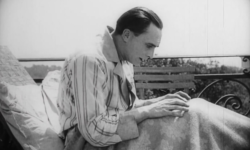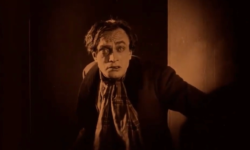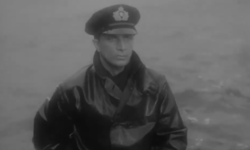The joke of
The Perfect Murder (1988) is that it is neither. Then again, despite its production credit, neither is it a Merchant Ivory except in the sense that it was executive-produced by Ismail Merchant in Mumbai. Directed by Zafar Hai who co-adapted the 1964 CWA Gold Dagger-winning source novel with its author H. R. F. Keating, it is an endearingly unwieldy triple-decker of comedy, crime, and city symphony, not necessarily in equal proportions or even order of priorities, but in a film so lovingly dedicated to the significance of imperfection, perhaps to expect anything else would be, like the case that gives the story its aptly misleading name, upside down.
Take the plot, a rococo compendium of cases from a smuggling ring to an attempted murder to a lost item report which pile chaotically onto the beleaguered hero only to cross-link at the last minute into the pattern so beloved of classically constructed mysteries in which even the silliest and most discursive puzzle-pieces can find a home. Or don't, since its Chandleresque twists and turns serve just as well as the frame for an essentially hangout movie that makes as much time for a kidnapping of mistaken identity as for the lie detector of a Nandi bull. Brought to the screen for the first and only time in his forty-five-year career by Naseeruddin Shah, Inspector Ganesh V. Ghote of the Bombay CID is an everyman of detectives, concerned, harassed, and unassuming in the khaki of his policeman's uniform that gives him far less authority dealing with government ministers and affluent businessmen than he might wish in the pursuit of justice. His self-deprecating honesty carries him through professional pratfalls like arresting the colleague he was sent to collect from the airport and tenacious gambles like anticipating the secret of a monsoon-drenched chandelier, but can't do much about the mundane middle-class problems of his salary and his schedule. "At the moment I'm trying to save to buy a color TV." Especially facing an impatient ACP, the last thing this modest, apologetically persistent officer needs is a wild card in the delicate negotiations of his job and of course that's exactly what he gets with the arrival of Stellan Skarsgård's Axel Svensson, Sweden's contribution to an international study of comparative police methods who wouldn't last ten seconds in a Nordic noir. It is culturally clever, but also just fun that the criminologist from the global north is decidedly the sidekick of the adventure, a lankily cheerful add-on who can be distracted by the most routine details of life in modern India—the marigold-garlanded mahurat shot of a Bollywood musical, a saffron-swathed sadhu under the colonnade of the Taj Mahal Hotel—looking at all times with his wilted straw hair as though he's been pulled out of the laundry half-steamed. "I've been running since I came to this country." He messes about the crime scene quoting
Hamlet in Swedish. He moons romantically over suspects and film stars and requires as dramatic a rescue as any damsel in distress. Just this side of a jam Watson, he isn't the total drag on the investigation that Ghote accuses on the sullen, tinderous afternoon their latest failure has left them uncharacteristically on each other's last culture-clashed nerves, but even after the rains have ecstatically broken and the whole back-to-front left-handed spanner of a case with them, he remains most valuable as the inspector's wingman, his flash-temper Viking-height backing up the Maharashtrian manners of Ghote as he holds his ground against official caution and unavoidable corruption and comes up at last with the colorfully elusive truth. "Upside down!" they salute the circumstances of their bonding, an affectionate in-joke now that Axel has fallen in love with the city in all its helter-skelter absurdity and Ghote has upheld the honor of its detecting. "Welcome to Bombay!"
Indeed, in the vibrantly semi-documentary photography of frequent Merchant Ivory DP Walter Lassally,
The Perfect Murder is a love letter to Bombay on the verge of its millennial renascence into Mumbai, not merely in the historical tourist postcards of the Victoria Terminus or the Gateway of India, but the street-level flânerie which does not treat ironically a stately elephant proceeding with the rest of the rush-hour traffic down Marine Drive, a Lovemate local train rattling between the washing-strung frontages of chawls, the chlorine-blue of the swimming pool at the Oberoi Towers and the cupped hands of beggars thrust like razor clams through the sand of Chowpatty Beach. The flooded green of a lawn of black umbrellas under the monsoon's curtain has no less reality than the green baize of an office inside the liner-white block of Mantralaya. It earths the Dickensian tendencies of the human characters whom Ghote has to wend his dogged way among, inconveniently factual even at their most flamboyant. Amjad Khan pulls out the Sydney Greenstreet stops as the expansively blusterous and epicurean builder Lala Heera Lal while Madhur Jaffrey in two scenes as his imperious wife blocks even the mildest hints of questioning as keenly as crucible steel. "What a woman. She was all the time giving me the feeling of being without my trousers on." Approaching the rest of the suspicious household nets a varied array of deflection, obstruction, and wasted time from Sakina Jaffrey as the languid daughter-in-law, Dilip Tahil as her ostentatiously clubbable husband, and Nayeem Hafizka as the histrionic younger brother whose room is exhaustingly tacked with self-portraits as Sherlock Holmes and posters for
Spellbound (1945) and
Vertigo (1958), insisting on playing the proper part of a murder suspect all the while the victim who could be a witness lies shtum under medical care and Parsi prayers, Dinshaw Daji's Mr. Perfect. "This is the sort of difficulty you have in police work in this city. If only people would behave in a simple, reasonable, logical manner!" It's too much to ask of even the heroes of this caper, out of sorts, out of place, out of luck, splashed with Holi dye or literally losing their shirt. Spouses in real life, Shah and Ratna Pathak have fun with the fractious marriage of the Ghotes, which would be far less in the soup if he would just once come home from work on time; the wistful fantasy he builds of her as the tranquil, docile, ideal Hindu wife would swerve too close to a shrew joke except for the time he brings the rescued Axel home for supper and Pratima turns on the best-bangled, bindi-dabbed, lord-and-master act with cut-diamond sarcasm. To complete the family business, their infant son Ved is an early cradle-credit for Imaad Shah. The sun in the intermingled score of synths, sarangi, and tabla by Richard Robbins, Sultan Khan, and Zakir Hussein catches on fish-scale silver, mango-skin gold, the half-risen skyscrapers of a city pushing itself toward maximum. Keating who famously wrote the first nine Inspector Ghote novels without visiting India for himself makes his Hitchcock cameo at the international terminal, waiting to catch the next flight back to Europe.
It can be an awkward movie. Its mix of Englishes and untranslated Hindi is no strain to be immersed in, but the loose, improvisatory feel of much of its dialogue means it has no pacing to speak of even when it has to hit its marks of revelation and its tonal shifts are sometimes more collision than collage; it is refreshing to find a detective film without an exchange of gunfire, but it could have deleted one of its billboard-tearing, barrow-overturning chase scenes that never fail to leave a wackier level of disorder in their wake than the sufficient bewilderment of yet another investigative dead end. All the same, when Axel with his farewell gift of a kurta draped like a college sweater around his shoulders swings back at the gate to shout his characteristically no-chill support for Ghote across the crowded terminal, the viewer may regret that with an eventual twenty-five novels to choose from, there were not more screen translations made of these odd little mysteries, "altogether upside down." I watched this one because I was intrigued by its peripheral Merchant Ivory-ness in the same way as the occasional co-productions of Powell and Pressburger for other writers and directors and as was the case with Vernon Sewell and Gordon Wellesley's
The Silver Fleet (1943), I did not regret its hour and a half of my time. I got its dead-out-of-print DVD out of the
Minuteman Library Network since the quality of the version available on
YouTube actually is ghastly even without the random audio drop-outs or the smear like tape across the lens. It deserves better, this sweet and slightly bemusing snapshot starring a pair of actors who have had my phone book recommendation for years. This welcome brought to you by my upside-down backers at
Patreon.
![[personal profile]](https://www.dreamwidth.org/img/silk/identity/user.png) scifirenegade) wrote2025-08-29 07:49 am
scifirenegade) wrote2025-08-29 07:49 am![[community profile]](https://www.dreamwidth.org/img/silk/identity/community.png) comment_fic, prompt was "not the marrying kind".
comment_fic, prompt was "not the marrying kind".

